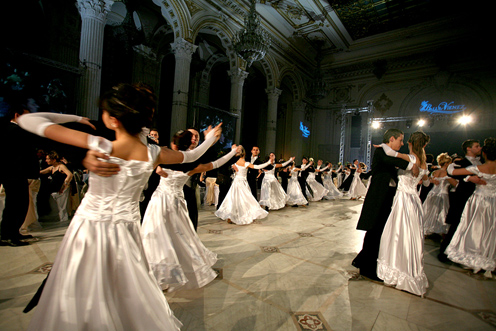Modern Austrian business society and old traditions at play in Romania: the Viennese Ball



 Austrians want to protect their national identity and remain in many ways a closed and introverted society. In Austria there is a historical respect for aristocrats, not unrelated to the nostalgia felt for the old empire. The Viennese Ball in Bucharest is one of the examples of a synthesis between modern Austrian business society and old traditions.
Austrians want to protect their national identity and remain in many ways a closed and introverted society. In Austria there is a historical respect for aristocrats, not unrelated to the nostalgia felt for the old empire. The Viennese Ball in Bucharest is one of the examples of a synthesis between modern Austrian business society and old traditions.
By Irina Budrina
At the heart of Austrian business life is the concept known as Sozialpartnerschaft - social partnership- based on a comprehensive system of chambers and associations, business and professional clubs. Membership is mandatory. There is a deep sense of community, which embraces the sense of belonging and mutual responsibility between companies and their employees. Loyalty and conservatism are also reflected in outside business relationships. It is difficult to break into existing supplier arrangements and then only if the type and standard of service are radically different.
Having a similar tradition in both countries – Romania and Austria – balls are a strong networking tradition where another Austrian trait for formality is lightly counterbalanced by an easy-going approach to life. The quality that Austrians value most in their social life and their personal relations at work is Gemutlichkeit, best described as a comfortable geniality. Photos of the Viennese Ball in Bucharest reveal old world elegance combined with a sense of informality.
Traditionally, Austria's ball season starts on November 11th at 11:11 and ends 40 days before Easter, giving Vienna a fairytale like atmosphere – the elegant, spectacular, well-mannered capital of the world.
The oldest and best known events of this type are: the famous Opernball, the Opera Ball, taking place at the Staatsoper, the Kaiserball (Imperial Ball) on December 31, at the Hofburg Imperial Palace, the Ball der Wiener Philharmoniker (Ball of the Vienna Philharmonic orchestra), a classy event in the building of the Musikverein, the Gala der Wiener Wirtschaft (Gala of the Viennese Industry) at the Hofburg Imperial Palace, and the Juristenball (Lawyers' Ball), one of the more upper-class balls, also in the Hofburg.
However it has also become customary that classical Viennese Balls are regularly organized outside of Austria, as for instance in New York, Washington, Moscow, London, Melbourne and not to forget the annual Viennese Ball in Bucharest. The first Viennese Ball was organized in Bucharest in 2006.
The grand ball, as a social event, was adopted by the Bucharest elite in the 19th century. The custom caught on so quickly that balls and receptions were soon competing in number, opulence and brilliance. Both foreign guests and Romanians agreed that among the grandest balls and receptions held in Bucharest in the mid-19th century were those hosted by Madame Otetelesanu and by Princess Irina Grigore Sutu. Most appreciable were those organized by Sutu, Stirbei and Bibescu.
Apart from the balls organized by important houses, another two fashionable events were on going by the time: The Jockey-Club and the Obolul-Club. The Jockey-Club ball, reserved for women and young ladies of the club and a reduced member of invited was regarded as “chic”. The Obolul ball, as a public fundraising event, was held in the National Theater hall.
Austrian leadership style is autocratic and authoritarian, which helped refresh this tradition in Romania. “Knowing the right people” is another strong point similar to Romanian business culture. At the same time Austrians are prepared to claim personal responsibility for decisions that in a collectivist culture like Romania would be ascribed to a team.
Many Austrians speak good English, although they stick to German wherever possible, even in a multicultural context. They have a factual, numerate and direct approach to communication that is intolerant to euphemism and allusion. Though directness and frankness can be sweetened by charm. The PR campaign for the Viennese Ball can be another confirmation of this type of communication.
This word “charm” can crop up most often in discussing Austrian manners. There is an engaging cordiality and genuine hospitality about their manners. Courtesy goes deeper than mere politeness. Being always well dressed and presentable, generous and hospitable but distant and respected at the same time.
irina.budrina@romania-insider.com